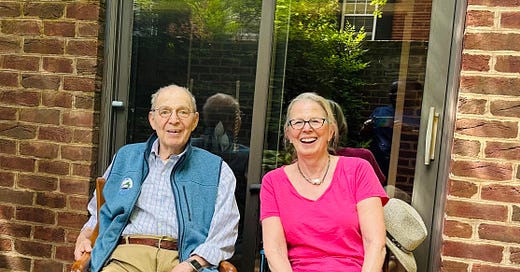One year later: Please don't say "Sorry for your loss"!
It's still complicated, but I am starting to take responsibility for my own self-doubt
Right after my dad died in late May, 2024, I didn’t feel raw grief, the kind that leaves you sobbing and bereft, with that ache in the chest when you realize you’ll spend the rest of your life missing someone. I didn’t feel waves of anger or despair. Actually, for several weeks, I felt nothing at all; or at least, I was clueless as to how I felt. A week after he died, I wrote a post with several updates: my podcast was ending after five years, it was my one-year anniversary on Substack, and oh yes, my father, age 93, had died after a long decline. So I was genuinely puzzled when readers’ comments were all about my dad (“sorry for your loss”) and not about the end of my podcast or the longevity of the [B]old Age newsletter.
It was not a “passing” occurrence that my dad had died after a 15-month decline, even though it felt that way at first. It was a big deal. This was a new reality… and I was grieving.
But reading the many comments of sympathy jolted me into examining my feelings more closely. It was not a “passing” occurrence that my dad had died after a 15-month decline, even though it felt that way at first. It was a big deal. This was a new reality that I had to integrate into my life and my being, and I WAS grieving. Still, much as I appreciated readers’ condolences, I found the phrase “sorry for your loss”1 to be unhelpful and uncomfortable, as it didn’t at all describe how I was feeling. My quibble with “sorry for your loss” prompted me to write a deeper follow-up post, which I’m sharing again today, along with an update on the changing nature of my grief.
For full access to this post and my archive of close to 100 [B]old Age articles, please become a paid subscriber at the current rate of $40/year. Can’t afford a subscription? Write to me at debbieweil@substack.com and I’ll give you a comp. 🙏
![[B]OLD AGE with Debbie Weil](https://substackcdn.com/image/fetch/$s_!i8Z0!,w_80,h_80,c_fill,f_auto,q_auto:good,fl_progressive:steep,g_auto/https%3A%2F%2Fsubstack-post-media.s3.amazonaws.com%2Fpublic%2Fimages%2Fdaaca764-d8d6-4a1b-bf58-61dbb72810fc_842x842.png)
![[B]OLD AGE with Debbie Weil](https://substackcdn.com/image/fetch/$s_!fEcd!,e_trim:10:white/e_trim:10:transparent/h_72,c_limit,f_auto,q_auto:good,fl_progressive:steep/https%3A%2F%2Fsubstack-post-media.s3.amazonaws.com%2Fpublic%2Fimages%2F95ad4442-e435-4ebc-a8d2-9c9b89a8bdb6_2100x400.png)

![[B]OLD AGE with Debbie Weil](https://substackcdn.com/image/fetch/$s_!i8Z0!,w_36,h_36,c_fill,f_auto,q_auto:good,fl_progressive:steep,g_auto/https%3A%2F%2Fsubstack-post-media.s3.amazonaws.com%2Fpublic%2Fimages%2Fdaaca764-d8d6-4a1b-bf58-61dbb72810fc_842x842.png)

